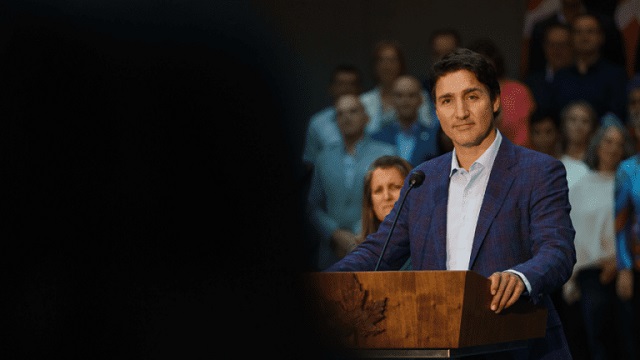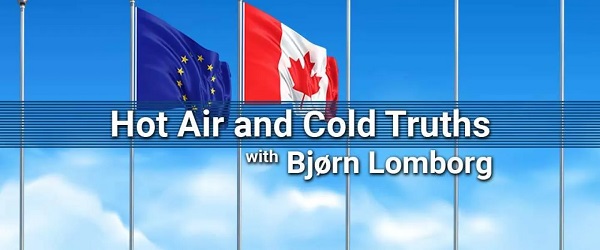By Jack Mintz
With growth flat and interest payments ballooning there’s no room for new spending unless deficits are cranked up again — a bad idea
In her economic update Tuesday, Finance Minister Chrystia Freeland just couldn’t help taking a swipe at Leader of the Opposition Pierre Poilievre when she declared: “Canada is not and has never been broken.” In the early 1990s, Canada did come close to needing IMF assistance, but Liberal finance minister Paul Martin’s 1995 budget pulled us back from the abyss by cutting program spending 20 per cent and putting the country back on a path towards balanced budgets. We did receive short-term finance from the IMF during the currency crisis of 1962, but we have never reneged on public debt, unlike hapless Argentina, which has defaulted nine times since its independence in 1816.
Canada may not be broken but the federal government is all but broke and is clearly running out of steam. With a weak economy growing only a little faster than population, there is not a lot of spending room left, not unless deficits and debts are cranked up again. As it is, debt as share of GDP jumps from 41.7 per cent in fiscal year 2022/23 to 42.4 per cent in 2023/24. So much for the fiscal anchors we were promised.
After that, the finance minister predicts, debt as a share of GDP will fall ever so gently to 39 per cent over the following four years. I am quite skeptical about five-year forecasts, especially from a government that over eight years has failed to keep any deficit and debt promises. The 2015 election commitment to cap the deficit at $10 billion is long gone. So is the promise to keep the debt/GDP ratio from rising. Even before the pandemic, federal debt was creeping back up to over 30 per cent of GDP. After eye-popping spending during COVID, any plan to return to pre-pandemic levels has been ditched. Instead, we just accept debt at 40 per cent of GDP and move on. And if a recession hits, you can bet your bottom dollar — which may be the only dollar you have left — that federal debt/GDP will reach a new plateau, also never to be reversed.
As Albert Einstein once said, “Compound interest is the eighth wonder of the world. He who understands it, earns it … he who doesn’t … pays it.” With growing public debt charges, expenditures are rising 13.6 per cent over the next three years, faster than revenues, which are forecast to grow only 12.2 per cent. Much of this spending growth is due to interest payments that are rising by almost a half to $53 billion in 2025/26. That is a ton of money — many tons of money — that could have gone to health care, defence or even, yes, general tax cuts. Instead, we are filling the pockets of Canadian and foreign investors who find Canadian bonds very attractive at the interest rates they’re currently paying.
Small mercies: At least the Liberals feel obliged to say they will keep the lid on spending in the short term. Thus they forecast program spending rising by only 10.5 per cent over three years, with a program review expected to trim its growth by $15 billion. On the other hand, the forecast for deficits averages close to $40 billion a year for the next three years.
Economic updates used to be just that, reports on how things are going, but increasingly they are mini-budgets that introduce new measures. With the Liberals sinking in the polls, housing affordability is the focus. But with higher interest rates and more stringent climate and other regulations adding to construction costs, it is unclear how much more housing supply will grow even with the new measures. New spending over five years includes a $1-billion “affordable housing fund” and the previously announced $4.6 billion in GST relief on new rental construction. There’s also $15 billion in loans for apartment construction and $20 billion in low-cost, government-backed CMHC financing, neither of which adds to the deficit.
When money is scarce, of course, nanny-state regulations come into play, as well. A “mortgage charter” will guide banks on how to provide relief for distressed owners (even though banks already prefer to keep people in their homes rather than foreclose). Deductions incurred by operators of short-term rentals will be denied in those municipalities and provinces that prohibit such rentals. Temporary foreign workers in construction will get priority for permanent residence.
The housing plan wasn’t the only focus in the economic statement. To address affordability and climate change, the current government takes pride in its pyramid of budget-busting subsidies for clean energy and regulations dictating private-sector behaviour regarding such things as “junk fees” and grocery prices. There’s also GST relief for psychotherapists and more generous subsidies for journalists and news organizations. (I suppose I should bend a knee to the minister and doff my cap.)
What’s missing in the statement? It barely mentions the country’s poor productivity performance. And you will word-search in vain for “tax reform,” “general tax relief” or “deregulation” aimed at spurring private sector investment. No mention is made that accelerated tax depreciation for capital investment, introduced in 2018, is being phased out beginning January 1st, which will discourage private investment, including in housing construction. Instead, the Liberal economic plan is all about more government, not less, to grow the economy. Without the private sector, that’s not going to work.


















